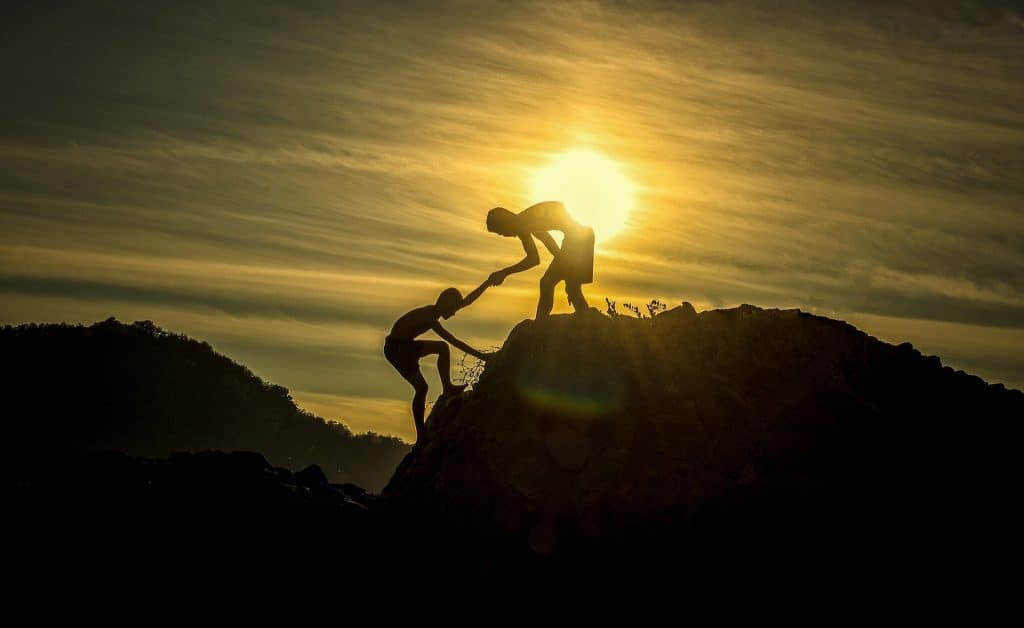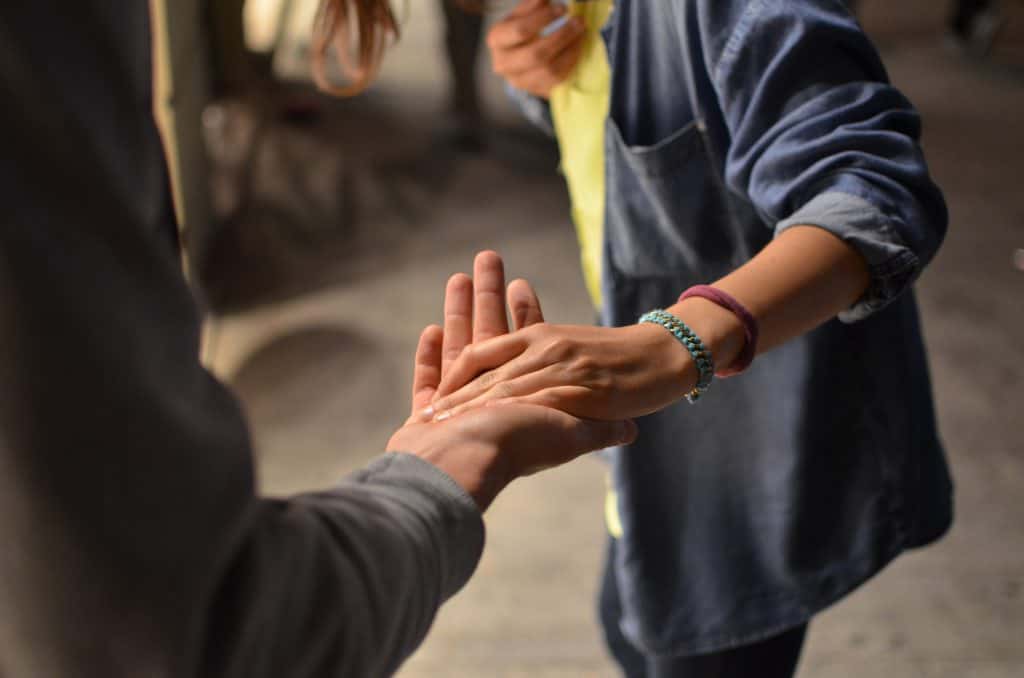
My previous post on feeling unheard and why this may be inspired this post. Recently, perhaps it’s the impact of a pandemic, I’ve noticed that sometimes help comes from unexpected people or places. And now that I’m thinking about it. I’m having conversations about this all the time. Perhaps it’s because I work in mental health. So, conversations often involve support networks and who you can talk to when you need help. And often the people we initially think of are our family; although not for all of us. Friends are often included too.
But we all have mixed relationships with our families. And friends aren’t always one homogenous group. We have friends who we want to talk to when we’re having a bad day. And friends whose advice doesn’t meet our needs but who are great to have a laugh with. Because there’s no one size fits all with people. Not all people are great at listening, know how to demonstrate empathy or help you feel heard. So, why do we always jump to family (and friends) as the first port of call? And what expectations does this create?
For Why Our Feelings Go Unheard and How to Get it Right read here
Why We Must Rewrite the Narrative on Support

I have certainly felt let down by people around me when I’ve needed support and felt that I couldn’t ask for it or that I have but returned empty handed. Sometimes people have simply been too busy. And whilst I’m determined never to be too busy for those around me. Life can get hard and we never know the true extent of what someone is going through. So, I’m determined to be kind, and logical, when my needs are unmet. Acknowledging that this isn’t usually intentional but rather a mistake.
However, on reflection of the past year, I’ve noticed that when the people I expected to be there for me weren’t. Often times other people were. Maybe these people haven’t been in my life historically which is why this feels more novel. Or perhaps we’ve needed each other to get through the past year plus and our relationship has blossomed. But it has taught me a powerful lesson. That sometimes the people that society teaches us should be there for us aren’t. So, how much heartache might we save if we to rewrite the narrative on who may support us when we need it most.
When Support Works Well

Do you have friends you’ve known for years? Sometimes these are family friends or people you have a shared experience with. Your journey together bonds you, although you may not have that much in common. Buy you’ve been friends in some description for what feels like forever. Then there are people you meet and you just click. They just get you. And then there’s family. Perhaps your family loves you unconditionally and you can turn to them for support. That’s fantastic. But we don’t all have that. I’m incredibly lucky to have an amazing family who love me. And yet, the support they sometimes show me is not what I need. It’s well intentioned but it doesn’t always hit the mark. Maybe you’re like me in that way. And, of course, there are some of us who don’t have family or don’t have family they can trust or rely on.
I can’t say what makes support the right fit and creates those bonds between people where you know you can talk to them about anything. And you’re needs will be met and heard. I imagine it’s a combination of who you are, who they are, your commonalities and how they demonstrate care and what your needs are. Among other factors I’m sure I’ve missed. But the key here, which I’ve heard expressed to me recently, is that sometimes the people we’ve known the longest or are closest to us genetically aren’t the people we necessarily want to turn to or will get the most support from.
For the 11 Tips You Need for Effective Listening read here.
For Best Practise Supporting Someone in Distress read here.
Real Support Networks
I think we need to reframe our messaging around who someone may wish to approach for support. When we discuss support networks letting people know that they’re incredibly individualized. That including people we think we should or who would expect to be included in our support network doesn’t serve us. Unless we would like to speak to them when we need some help. And that it’s okay to have a variety of different people in your network who may help you in different ways. Perhaps a medical professional who you can turn to when you’re in crisis, a friend – no matter how long you’ve been friends for – when you’re having a bad day. Someone who is great at listening and another person who can problem solve well. Of course, some people in your support network may hold multiple roles. But they should all be there for you.
So, when we talk about support networks let’s think broadly about who may be included. And what role(s) they may hold in our support network. Let’s normalize that we may need some of these people more than others. But let’s really talk about who these people may be. That it’s ok if they’re not your nearest and dearest. We really need to highlight this as many of us don’t have the relationship with our families in this way. Or perhaps, the idea that family or friends should be the people you talk to pressurizes us or makes us feel guilty when they’re not.
Additionally, it’s fine if they aren’t the people who turn to you for support. Sometimes we have relationships which are a two way street when it comes to support. But it’s ok if they turn to us for help but we turn to others. Because, support networks aren’t fit for purpose if they don’t work for you. And sometimes, help comes from unexpected places.
For The Crucial Difference Between Sympathy and Empathy read here
What are your thoughts on support from unexpected places or people? Is it your experience? Let us know below! .


This is a really interesting question/topic as I am sure there are many people (probably even myself included) that seek support out from the same person/people. Which if/when they cannot help us, we can all too often accept or believe that we cannot work through something or are undeserving of that help — and that is truly impactful. This has really given me food for thought here — thanks for posing this and showing that support can/should be sought from a range of places and people.
Thanks Molly. I think it’s important that when people can’t help us we remember that doesn’t mean there is no help. Just that we have to go looking elsewhere. Which can be exhausting and knock our confidence. But it is worth reaching out for support because you never know where you may find it and what doors it may open or new relationships it may lead to.
What an insightful post. Thanks! True, support can come in unexpected places. For me it’s people I take care of, friends from High school, and people at work, I would of never thought.
~Michelle
https://michellescrazybusylife.net
Thanks Michelle. I think we underestimate where support can come from and how people we don’t think would necessarily care are always happy to help!
I can relate to this as I’ve found support in the most unexpected places. Sometimes family and friends just don’t understand and that’s okay. They don’t like to see someone they love in pain and its sometimes useful to speak to someone who is distanced from you.
I think it’s really interesting that sometimes people who care for us are too close to the problem. Like we are ourselves. And that’s why they can’t help because their feelings for us and worry overwhelm them too. And that’s when we need to turn to others who have some more distance from the issue and can see it more clearly.
Friend in need is a friend indeed, unfortunately such type of friends are very hard to find, the so called friends are with you until everything is going well and when you get caught in trouble and you are expecting some help from their side they just flee away and behave like they never know you. And sometime stranger are far more helpful for us. So, the moral is Expectations hurt don’t expect anything from anyone.
I think it depends on the person. Some people just aren’t equipped to help or have too much going on in their own lives and instead of telling us this they just run away which is more hurtful. And sometimes the person we least expect has the knowledge or wisdom to give us what we need.
this is a very interesting topic to discuss. i’ve found through experience and the loss of a parent recently, i’ve found support in the most unlikely places and with the most unlikely people. i’ve made stronger connections with people i didn’t have that before. and i’m learning to understand sometimes, grief is a lonely walk.
I’m sorry to hear about your loss but I’m glad you have found support. Sometimes the people who reach out to us are not who we expect.
Support doesn’t have to come from family. It can come from anywhere and usually arrives just in time.
Agreed. Sometimes we have to think broadly about where support can come from and who can offer it to us. Sometimes it can surprise us!
This is an interesting post. Many times we seek support from people we feel really comfortable to be around. Yet, if they cannot offer the support we need, many times that can leave us feeling lonely and defeated. I know I’ve definitely had moments of feeling like this.
Same. Sometimes they just don’t know what to say or how to help. And it can feel confusing because we feel so close to them in other ways.